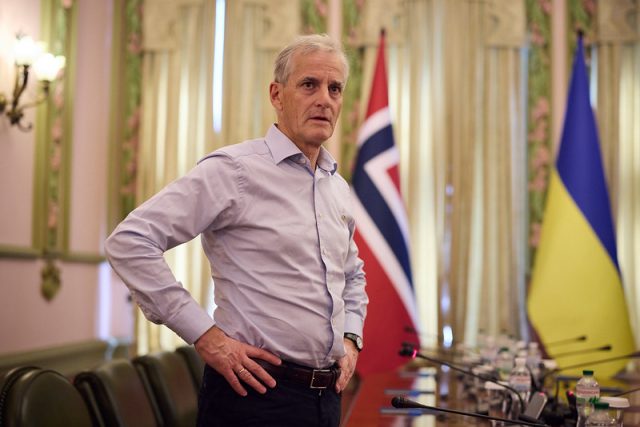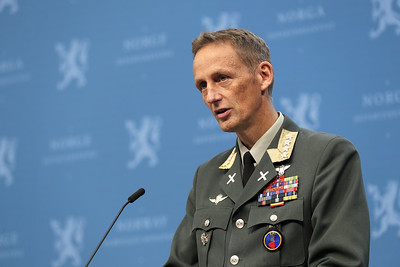NEWS ANALYSIS: Prime Minister Jonas Gahr Støre has lurched from crisis to crisis during his minority government’s first year in office, and found himself facing more trouble this week. Not only does he need to quickly improve Norway’s own defense, as Russia’s war on Ukraine hits closer to home, broken promises in his government’s proposed state budget have angered voters and left his embattled Labour Party with its lowest poll results ever.

Støre has been on the defensive himself since Labour and the Center Party formed their minority coalition after last autumn’s election. His party was immediately accused of caving in to far too many of the protectionist Center Party’s demands, and they charted a course that failed to generate much enthusiasm.
Then the Corona crisis was quickly replaced by the crises created by Russian President Vladimir Putin when he began sending troops to the borders around Ukraine and then invaded in February. The crisis launched by the war itself has since been joined by the energy- and economic crises that followed. As Putin began using energy as a weapon, Norway was drawn firmly into the fray as a major supplier of energy. The country has grown even richer than it already was, given skyrocketing prices for gas and electricity, but also has become a target and found its defense of important energy infrastructure to be “unsatisfactory.”
Meanwhile Norwegians themselves are also now facing rapidly rising prices, higher interest rates and record monthly bills for the power they once took for granted. In the midst of it all, Støre’s government rolled out its first state budget proposal, and the griping has since turned into howls of protest. The budget, which Støre and his ministers claim had to be “tight” in order to keep the economy from overheating, is full of unpopular cuts, omissions and lots of new and rising taxes. His attempt to redistribute wealth while also keeping inflation down is backfiring badly.
That was evident in a new public opinion poll that shows voters turning their backs on the government and giving the opposition a solid majority. Støre’s once-mighty Labour Party fell to an astonishing 18.2 percent, its lowest level of voter support ever and more than eight points down from last year’s election results. The Center Party did even worse, all but collapsing from levels as high as 20 percent two years ago to just 4.3 percent during the period when the poll was taken (October 25-30).
That leaves the government with support from just 22.5 percent of Norwegian voters, while the Conservatives alone now hold 32.4 percent. Their former government partner, Progress, has also continued to recover from the last election’s disappointing result, and now holds 14.7 percent of the vote. If the poll had been an election, former Prime Minister Erna Solberg’s Conservatives and Progress would have a majority in Parliment.

Political commentators are widely blaming “broken promises” in the government’s proposed state budget. Støre and his ministers insist they had to set tough priorities, and claim that lots of programs and projects need to be postponed. They found a few hundred million kroner to cover administrative costs of reversing unpopular municipal and county mergers, and farmers won record levels of subsidy and tariff protection (both key Center Party demands), but meanwhile lots of transport, cultural and even defense projects have been put on hold. Heavy new taxes are being imposed on both businesses and individuals, adding to their costs as inflation takes off. Even a major increase in defense spending has been branded as inadequate.
“Expectations were high over everything that was supposed to happen,” wrote commentator Kjetil B Alstadheim in newspaper Aftenposten on Wedneday. He thinks all the campaign and platform promises were “unrealistic” and then became even harder to fulfill because of all the consequences of Putin’s war on Ukraine and now “the West” in general. “That irritates people,” Alstadheim wrote, noting that most Norwegians are now paying more and getting less on a variety of fronts.
Meanwhile, Støre faces numerous other challenges after publicly stating this week that Putin’s war “is coming closer to Norway and our lives.” Neither he nor other government officials and military experts expect Russia to invade Norway, but signs of hybrid warfare are piling up quickly. Pipeline sabotage in the Baltic Sea has raised alarms over Norway’s own pipelines, as unidentified drones fly around Norwegian oil and gas installations. Several Russians have already been arrested for operating drones in Norway (in defiance of sanctions against Russia) and last week’s arrest of an alleged spy in Tromsø have set off alarms, too. The suspect has since been charged, identified and jailed.
It all prompted Støre to have Defense Chief Eirik Kristoffersen, a four-star general, by his side this week when he announced how Norway needed to enter “a new phase” of military preparedness. The main goal is to raise alertness, protect energy installation and secure other critical infrastructure.

Neither Kristoffersen, Støre nor Defense Minister Bjørn Arild Gram will reveal details of their new plans, but the defense chief will now have much more freedom and ability to redeploy troops and military equipment from one part of the country to another. The military needs to secure its own bases and military aircraft is likely to be spread more evenly around the country. Defenses forces will be sailing and flying more in and around Norwegian territory, and military surveillance is expected to be high, all in cooperation with NATO allies, several of which are already present in Norway.
The “new phase” is meant “to address an uncertain situation, which has clearly become more serious,” Kristoffersen told Aftenposten. “It’s important to take more steps to keep Norway secure.” Acquiring new maritime helicopters is also a priority, after new, long-troubled NH90 helicopters had to be grounded earlier this year.
The military escalation has been called “quite dramatic” and a sign that “we are under pressure,” defense researcher Ståle Ulriksen of Norway’s naval war college told newspaper Dagsavisen. Prime Minister Støre, meanwhile, is clearly under the most pressure of all.
“This is to secure Norway good preparedness and the ability to act in the most serious security situation we have experienced for several decades,” he said at his press conference on Monday. “It means we must be sharper and be able to get more vessels out at the same time and aircraft in the air.” Soldiers in Norway’s Home Guard are reportedly motivated to offer support. Støre can only hope voters will, too.
NewsinEnglish.no/Nina Berglund

